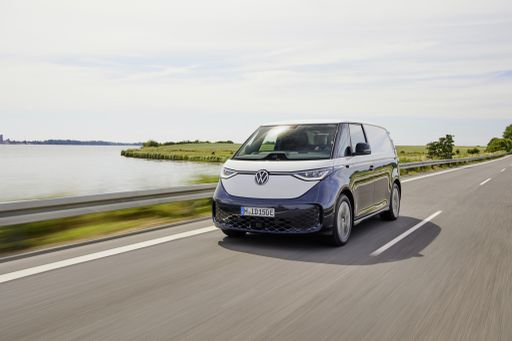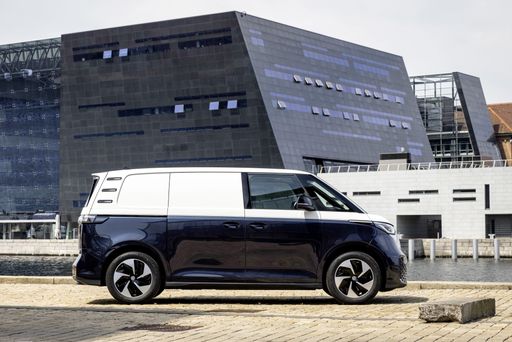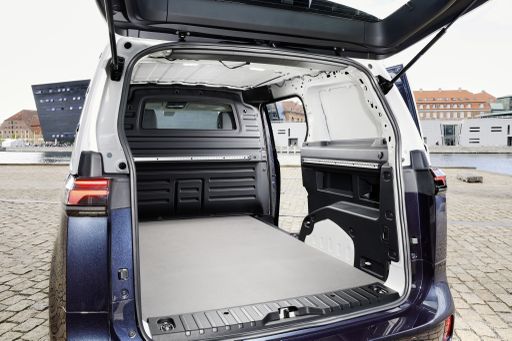Toyota Proace Bus vs VW ID. Buzz Cargo - Differences and prices compared
Compare performance (180 HP vs 340 HP), boot space and price (31600 £ vs 43600 £ ) at a glance. Find out which car is the better choice for you – Toyota Proace Bus or VW ID. Buzz Cargo?
Costs and Efficiency:
Looking at overall running costs, both models reveal some interesting differences in everyday economy.
Toyota Proace Bus has a clearly perceptible advantage in terms of price – it starts at 31600 £ , while the VW ID. Buzz Cargo costs 43600 £ . That’s a price difference of around 12000 £.
In terms of energy consumption, the advantage goes to the VW ID. Buzz Cargo: with 19.20 kWh per 100 km, it’s clearly perceptible more efficient than the Toyota Proace Bus with 24.20 kWh. That’s a difference of about 5 kWh.
As for electric range, the VW ID. Buzz Cargo performs clearly perceptible better – achieving up to 455 km, about 112 km more than the Toyota Proace Bus.
Engine and Performance:
Power, torque and acceleration say a lot about how a car feels on the road. This is where you see which model delivers more driving dynamics.
When it comes to engine power, the VW ID. Buzz Cargo has a convincingly edge – offering 340 HP compared to 180 HP. That’s roughly 160 HP more horsepower.
In terms of top speed, the Toyota Proace Bus performs minimal better – reaching 170 km/h, while the VW ID. Buzz Cargo tops out at 160 km/h. The difference is around 10 km/h.
There’s also a difference in torque: VW ID. Buzz Cargo pulls significantly stronger with 679 Nm compared to 400 Nm. That’s about 279 Nm difference.
Space and Everyday Use:
Whether family car or daily driver – which one offers more room, flexibility and comfort?
Seats: Toyota Proace Bus offers decisively more seating capacity – 9 vs 3.
In curb weight, Toyota Proace Bus is noticeable lighter – 1835 kg compared to 2264 kg. The difference is around 429 kg.
When it comes to payload, Toyota Proace Bus convincingly takes the win – 1265 kg compared to 753 kg. That’s a difference of about 512 kg.
Who wins the race in the data check?
The VW ID. Buzz Cargo has only a minor advantage in the objective data comparison.
This result only shows which model scores more points on paper – not which of the two cars feels right for you.
Costs and Consumption
View detailed analysis
Engine and Performance
View detailed analysis
Dimensions and Body
View detailed analysis

VW ID. Buzz Cargo
Toyota Proace Bus
The Toyota Proace Bus is a pragmatic people‑mover that swallows passengers and luggage with the kind of everyday practicality fleet managers and large families will appreciate. It may not thrill the enthusiast, but its sensible layout, sturdy build and Toyota badge make it a dependable, no-nonsense choice for anyone needing space and reliability rather than flash.
detailsVW ID. Buzz Cargo
The VW ID. Buzz Cargo marries retro Volkswagen charm with a thoroughly modern electric work van, offering a surprisingly spacious and practical load area wrapped in friendly, iconic styling. It's a smart pick for urban tradespeople and small businesses who want quiet, effortless driving, lower running costs and easy maneuverability — with a healthy dash of nostalgia on the job.
details


Costs and Consumption |
|
|---|---|
|
Price
31600 - 57100 £
|
Price
43600 - 51400 £
|
|
Consumption L/100km
6.5 - 6.7 L
|
Consumption L/100km
-
|
|
Consumption kWh/100km
24.2 - 24.3 kWh
|
Consumption kWh/100km
19.2 - 20.3 kWh
|
|
Electric Range
218 - 343 km
|
Electric Range
330 - 455 km
|
|
Battery Capacity
-
|
Battery Capacity
59 - 79 kWh
|
|
co2
0 - 177 g/km
|
co2
0 g/km
|
|
Fuel tank capacity
69 L
|
Fuel tank capacity
-
|
Dimensions and Body |
|
|---|---|
|
Body Type
Bus
|
Body Type
Cargo Van
|
|
Seats
5 - 9
|
Seats
3
|
|
Doors
4 - 5
|
Doors
4
|
|
Curb weight
1835 - 2140 kg
|
Curb weight
2264 - 2510 kg
|
|
Trunk capacity
0 L
|
Trunk capacity
-
|
|
Length
4983 - 5333 mm
|
Length
4712 mm
|
|
Width
1920 mm
|
Width
1985 mm
|
|
Height
1890 mm
|
Height
1932 mm
|
|
Max trunk capacity
-
|
Max trunk capacity
3900 L
|
|
Payload
825 - 1265 kg
|
Payload
640 - 753 kg
|
Engine and Performance |
|
|---|---|
|
Engine Type
Electric, Diesel
|
Engine Type
Electric
|
|
Transmission
Automatic, Manuel
|
Transmission
Automatic
|
|
Transmission Detail
Reduction Gearbox, Manual Gearbox, Automatic Gearbox
|
Transmission Detail
-
|
|
Drive Type
Front-Wheel Drive
|
Drive Type
Rear-Wheel Drive, All-Wheel Drive
|
|
Power HP
136 - 180 HP
|
Power HP
170 - 340 HP
|
|
Acceleration 0-100km/h
13.30 s
|
Acceleration 0-100km/h
-
|
|
Max Speed
130 - 170 km/h
|
Max Speed
145 - 160 km/h
|
|
Torque
260 - 400 Nm
|
Torque
310 - 679 Nm
|
|
Number of Cylinders
4
|
Number of Cylinders
-
|
|
Power kW
100 - 132 kW
|
Power kW
125 - 250 kW
|
|
Engine capacity
2184 cm3
|
Engine capacity
-
|
General |
|
|---|---|
|
Model Year
2024 - 2025
|
Model Year
2024
|
|
CO2 Efficiency Class
A, F, G
|
CO2 Efficiency Class
A
|
|
Brand
Toyota
|
Brand
VW
|
What drivetrain options does the Toyota Proace Bus have?
The Toyota Proace Bus is available as Front-Wheel Drive.
